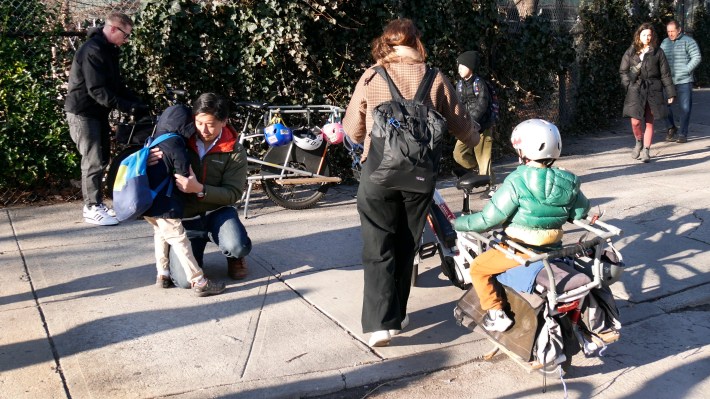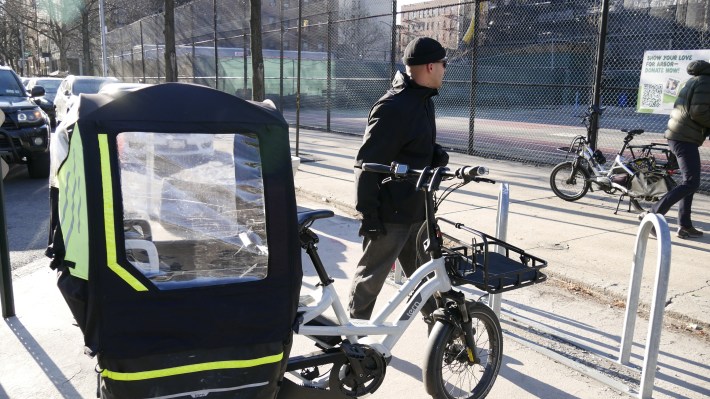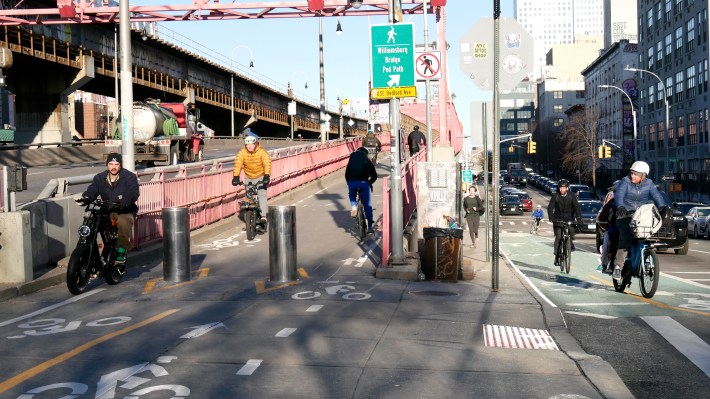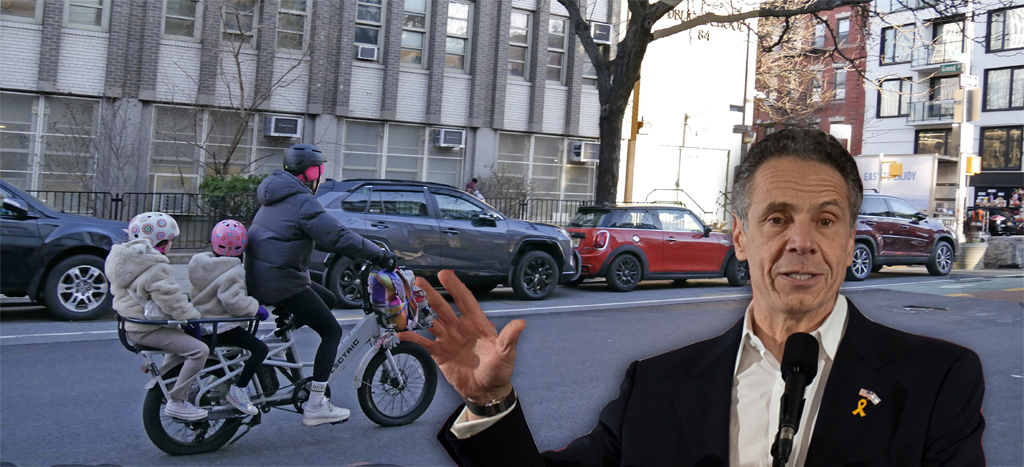Mayoral candidate Andrew Cuomo is embracing a Republican-backed e-bike registration plan with no proven safety benefits and serious downsides for families and seniors who rely on the vehicles, according to Big Apple e-bike owners who say they feel "demonized" by the proposal.
Cuomo, who as governor signed the bill that legalized e-bikes, has endorsed Council Member Bob Holden's proposal to require the city Department of Transportation to create an entirely new system for registering and affixing license plates to all e-bikes. The agency says this will cost $20 million, and there is no certainty that putting license plates on bikes will improve safety, just as license plates on cars has not reduced their destructive power.
As such, the goal of the legislation appears to be to discourage New Yorkers from using e-bikes — and Cuomo's support for it frustrates e-bike riders.
“Cuomo loves to demonize the subway, demonize e-bikes,” said Jim Burke, a Queens cycling advocate who started riding an e-bike after a recent heart attack. "My partner is a senior citizen and we cannot navigate a lot of the city without using an e-bike. For health reasons, we have no choice. Would you rather us each get in a car? It makes no sense to me."
City policymakers should focus on making streets safer for cyclists and pedestrians instead of wasting resources on a futile regime, other e-bike riders say.
“It is absolutely frustrating,” said Noel Hidalgo, a North Brooklyn parent who uses an e-bike to get around the city. "We [as parents] all have the same concern. These are the greatest devices for us to get around the city, to carry our kids and to be parents with all of the complex responsibilities that we have.
"We need infrastructure that is safer than what it is," Hidalgo added. "The whole framework of having to get these utilitarian tools registered and licensed is not addressing the safety issue. This is a fundamental design issue — our streets are not designed for the most vulnerable road users.”
In New York City there are three main groups of e-bike riders: users of electric Citi Bikes, e-bikers who are commuting or doing errands, and delivery workers.
All three groups would benefit from protected bike lanes with more space to accommodate e-bikes and their slower “acoustic” counterparts, but instead of focusing on the ways to improve safety for these users, as well as pedestrians and drivers, Cuomo and his allies are focusing on registration for all electric bikes, which wouldn’t make things safer.
A great tool for parents
But cargo e-bikes are growing in popularity for busy New York City parents even as politicians propose new barriers to their use.

On weekday mornings before 8:30 a.m, electric cargo bikes roll in one after another at a small pedestrian island in Williamsburg where S. 2nd Street meets Borinquen Place to drop off their kids at P.S. 141 Brooklyn Arbor Elementary School.
For these parents, something as simple as an e-bike has opened up their world.
“I bought my e-bike when my daughter was in pre-K three years ago and I’ve put almost five thousand miles on it,” said Phillip Von Borries, one of the e-bike riding parents at school drop off on Tuesday. “I've lived in New York for over 20 years and it’s changed my relationship with living in the city. It’s been just amazing going everywhere with my daughter.”
Another Brooklyn dad, who has been shuttling his two kids around on an e-bike for five years, said the e-bike does what a car would do for him and his family — but even better because he doesn't have to deal with traffic.
“It does replace a car,” said Silas, who declined to share his last name.
“My kids did gymnastics summer camp at Chelsea Piers and I would ride them up there [from Brooklyn] and then go to work which is in Lower Manhattan. It’s easy to get exactly where you need to get. You don’t have traffic. It gets the kids aware of the street surroundings and I get a little bit of exercise even with the pedal assist.”
The e-bike helps with the unpredictability of being a New York City parent, said another dad, Sergio, who also declined to share his last name.

"Unplanned school changes happen and to get there could be a nightmare," Sergio said. "I have two kids so you have to juggle them, having the e-bike just gives me the flexibility to get places faster. Now I am going to go buy groceries and load this up and I don’t have to worry about parking or parking tickets."
Maddy Novich, aka the social media influence Cargobikemomma, helps other parents take the plunge to purchase the useful devices.
Novich said she personally feels safe riding her bike in Manhattan because of protected bike infrastructure like Central Park’s paths. The attacks on e-bikes from politicians — including a proposal to ban the devices from city parks — are part of a larger misunderstanding of the value of e-bikes, she said.
“The removal of e-bikes [from parks] is a misunderstanding of what they’re being used for,” said Novich. “The majority of e-bikers in my orbit are parents just trying to get their families from Point A to Point B safely. To punish us or remove this as a mechanism for us would really be devastating.”
Not just for carting around the kids
E-bikes aren't only useful for parents — New Yorkers of all stripes have turned to the devices as an easier way to get around town.
John Maier, a long-time Ridgewood resident and member of the bike group Ridgewood Rides, said e-bike has become increasingly useful as he's gotten old.
“I can see, as I get older that [my e-bike] is going to be a much more common grab [from my bike collection]. Why fight to get somewhere? I love to ride, but do I have to knock myself out every time? I can still get places in a much better way, use less road space, be more considerate of people, and have less impact on the environment," Maier said.
“I know what it can do for me. I don't sweat, I can go up hills much easier. … I don't need high speeds, I want to just assist myself and make the hills a little less difficult and make a trailer easier and things like that."
Kyshon Byam, the general manager of Greenpath Electric Bikes, in South Slope, which has been in business for almost 10 years, often hears from customers that e-bikes symbolize freedom, especially when they live in areas underserved by the city’s mass transit system.
“We have some customers, they can’t walk, but they can ride a tricycle, and it gives them that level of freedom again,” said Byam. “Bicycles are one of the freedoms that we still have. I’m not saying the freedom to ride recklessly, but we generally have a right to travel and bikes are the closest thing to walking and running as you can get. Needing a license and insurance is a slippery slope, I remember a few years ago the city was proposing to do this for regular bicycles, so, where does the regulation stop?”
Department of Transportation Commissioner Ydanis Rodriguez agrees that registering and licensing e-bikes is a distraction from real discussions of what will make roadways safer.
"We have been hearing about [street safety] issues [but] reckless driving by motor vehicle drivers remains — by far — the biggest threat to pedestrian safety," he said at a Council hearing last year.
Cuomo's three classes
New York has three classifications of e-bikes:
- "Class 1" e-bikes are “pedal assist,” meaning the bike looks a lot like a traditional bike and the battery power only kicks in when the rider pedals. These bikes can go up to 20 miles per hour.
- "Class 2" e-bikes, which also max out their speeds at 20 miles per hour, are a combination of pedal assist and a throttle, meaning the rider can make the bike “go” with the push of a button.
- "Class 3" e-bikes are the same as class 2, except they can reach speeds up to 25 miles per hour with the throttle.
All three classes are allowed in bike lanes on city streets, in parks, and over bridges — a regime Cuomo himself legalized in 2021. Cuomo supporters who object to electric bikes favor restricting all classes, but most street safety advocates are focused on class 3 bikes, which many states classify as motor vehicles, not e-bikes.

"[But] New York legalized 'Class 3' e-bikes in 2020, and this creates safety challenges and controversy, as these vehicles, better described as 'e-motos' rather than e-bikes, can pose dangers on the road and increase risks due to substandard battery safety," said Ryan Birkicht, spokesman for PeopleForBikes.
But Byam, who sells electric bikes to commuters and parents, says that he gets people coming in all the time asking for the fastest bikes on the market. To him, New York’s unique e-bike class makes sense for a unique city, and limiting the type of e-bikes to only classes 1 and 2 wouldn’t work in New York City.
“I don’t think that works here, we have to balance what is safe with what people want. People usually ask for class 3,” said Byam, who pointed out that speed cameras don’t even issue tickets to cars unless they are going 11 or more miles per hour over the 25-mile-per-hour speed limit.
To Byam, the politicians that are attempting to regulate e-bikes don’t understand their use cases, which is why the suggestions seem out of touch.
“None of these people work in shops or actually use bikes to get from place to place. If you look at the map of the city there’s a lot of train lines that are not connected. Now we’ve found our own means, an easy form of travel. … Us as bike riders and as bike shops that represent the greater bike community can be thinking about proposals to offer the city so we're not just saying ‘no we don’t want that.’”
Streetsblog reached out to the Cuomo campaign with questions about why the candidate believes registering and licensing electric bikes will make roadways safer. Jason Elan, a spokesperson for Cuomo's campaign, said only this:
"The lack of clear e-bike rules and regulations have created a dangerous and chaotic situation on our streets that has sadly resulted in too many injuries and avoidable tragedies. New York City's streets cannot become the Wild West, and Gov. Cuomo is committed to passing sensible safety laws that protect pedestrians, discourage reckless behavior, and promote safe and accessible micro-mobility usage for all New Yorkers."
He did not respond to follow up questions.






